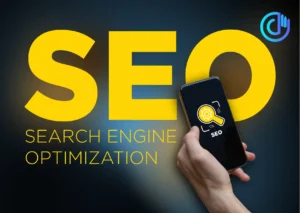Saving time and targeting the right audience are important to gaining more benefits from your digital marketing strategies. As we know, the use of artificial intelligence has changed almost every field of life.
It is also possible to craft smart digital marketing strategies with the correct use of AI. It can automate tasks and personalize campaigns more effectively for specific audiences.
Digital Optimizer Winning Marketing Strategies with AI
Digital Optimizer leverage artificial intelligence to develop hyper-focused marketing programs. At Digital Optimizers, we create marketing campaigns that enhance brand awareness and deliver results by combining human creativity with AI technology.
AI-Powered Marketing
AI marketing is an approach that we use to enhance the experience of customers. We can use AI to improve customer service easily and effectively with digital optimization. AI can also optimize the impact of marketing efforts. Without AI, people need to market their products or brands. It is difficult for them to tell all the people about their brand. But the AI approach uses tools like extensive data analysis and machine learning. It gains the knowledge of the customers and then provides its services according to the data. This is the best strategy for bringing in customers.
AI reduces customer ambiguity in marketing and support interactions. There are uses for AI marketing that can be very flexible, including content creation, managing PPC ads, and improving web design. This innovative approach streamlines processes and enhances overall results.
For example
To boost conversions, for instance, businesses like Amazon use AI-driven suggestions to predict what shoppers may want next.

AI’s Role in Content Creation and Planning
Content marketing is now a widely used strategy; some even see it as the primary way to promote today. AI can collect and generate content, sharing it with people on the right platforms. At a basic level, AI already helps make content automatically. In the future, it might suggest ideas for writers or create first drafts based on certain things.
AI can also help marketers come up with complete content plans. This is already happening in different marketing tools, and it could eventually make detailed reports about content work with very little human help.
AI-Driven Advances in Digital Advertising
Supercharge Lab emphasizes how artificial intelligence is transforming the advertising industry. AI is used in many of the digital advertising strategies used today.
These systems operate independently, using intelligent algorithms and vast data to display suitable ads to the right people. This is an easy way for companies to advertise their products.
In the past, making ads was mainly about being creative. Although originality is still important, companies require more for their advertisements to be successful. It all come down to selecting the right audience and delivering the right message to them.
Whether we are consumers or buyers for businesses, we are constantly bombarded with ads. But because they don’t catch our attention, we usually ignore or skip most of these ads. Advertisers ultimately lose money as a result.
Utilizing AI in Digital Marketing
Artificial Intelligence (AI) has become essential for digital marketing strategies. Companies advantage AI in several ways, including:
Chatbots
Chatbots are familiar and widespread. They’re computer programs that mimic human conversation, often seen as online customer service agents. A chatbot is a tool that can assist a brand in growing. Advanced chatbots include Google’s Bard and ChatGPT. These clever chatbots can write articles, translate text, and do a lot of other things.
However, their content creation skills may differ from a human’s expertise. It can write the data that we are unable to compose ourselves. It’s been proposed to use chatbots for content creation, but they need to be on par with human writing skills in terms of engagement and quality. We cannot only use chatbots to write articles; they need to provide us with contact humans’ notes in their language.
ChatGPT vs Bard
ChatGPT and Bard may appear similar, but they rely on separate datasets and models. Google’s Bard operates on the Language Model For Dialogue Applications, whereas ChatGPT utilizes the Generative Pre-trained Transformer model. Due to these differences, you can expect slightly varied outcomes when using each. The data that we get from both these tools is different. So, we must select the device that gives us the data according to our demand.
It’s important to note that ChatGPT and Bard are subject to errors despite the model variations. If you decide to use either, always ensure human fact-checking and review of the generated content.
Enhancing Content Strategy with Predictive AI
AI gives marketers a unique option that predictive data for client decisions. We can also predict the data by using AI. The AI models are well-trained to perform their tasks accurately and quickly.
You must only tell them about the study and wait for the expected output. You can use artificial intelligence (AI) to show customers products that they are interested in based on their past purchases. AI can use data to predict future actions of leads and customers, like making a purchase or subscribing to a newsletter. You can modify your content strategy to get the best results by using these predictive capabilities.
Advancing Visual Search with AI
Artificial Intelligence (AI) shows an impressive talent for matching visuals. A potential customer uploads a picture of something they want to buy, and AI searches for that item or something very similar. Artificial Intelligence (AI) shows an impressive talent for matching visuals.
A potential customer uploads a picture of something they want to buy, and AI searches for that item or something very similar. This is only possible when you use image recognition technology for your business.

Also, you will find out what your clients like, and you can utilize that information to create better sales. The more ease and enjoyment added with personalization of the shopping experiences will pay off in sales; ultimately, satisfied clients mean sales for you.
Embracing Voice Search
In 2020, about half of all searches were done using voice. By 2022, about 71% of folks will prefer talking to their devices rather than typing. With an amazing 95% accuracy rate, Google’s exceptionally intelligent algorithms can now comprehend human language.
Voice search is fantastic; it’s quicker and easier to find stuff. This trend will shake up how we make websites easy to find SEO. That’s why marketers must make their content friendly for voice, using longer phrases that people might say aloud. It’s also wise to focus on showing up in local searches. People often say “near me” when they ask for their devices. You can make web pages that give straight-up answers to common questions.
Getting to the Correct Audience
Ensuring that the appropriate individuals hear your message at the appropriate moment. Google Analytics, powered by AI(Artificial Intelligence), helps you understand your audience’s location, age, gender, education, income, job, and interests.
This helps you know who would be most interested in your offering. Consider AI to be an extremely intelligent data specialist. It analyzes a wealth of personal data to assist marketers in determining the most effective ways to market to various customer segments. Your emails can even be personalized by AI. It turns routine emails into friendly, personalized communications that boost client excitement.
Conclusion
AI is not only changing digital marketing, but it is also offering companies a tremendous competitive advantage. But technology alone is insufficient for success. You still need human judgment, intuition, and ethical authority. Digital Optimizer believes in applying human intellectual capacity with AI principles to reach more responsible and innovative strategies. If organizations are able to balance this, they can achieve sustainable growth as well as improve customer relations and market positions in the extremely fast-paced digital marketplace of nowadays.
